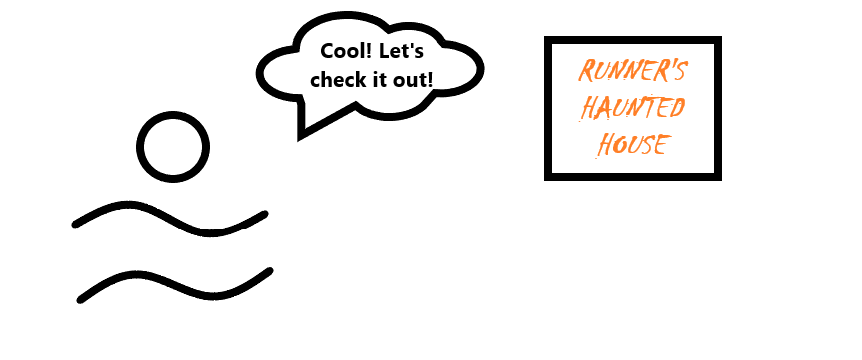
Running has taught me, perhaps more than anything else, that there is no reason to fear starting lines… or other new beginnings.
Amby Burfoot
Visit our shop for cool triathlete merchandise!
Subscribe to receive updates and exclusive content!
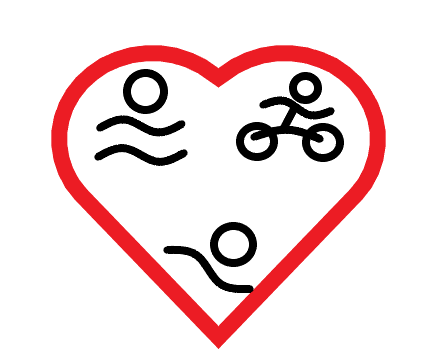
Say I love you to those you love:
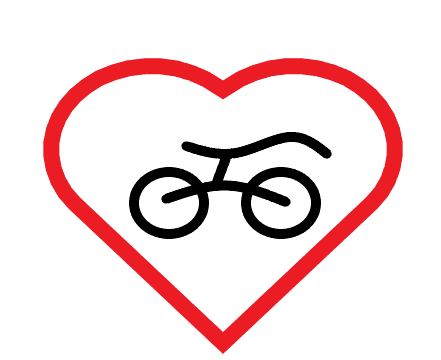
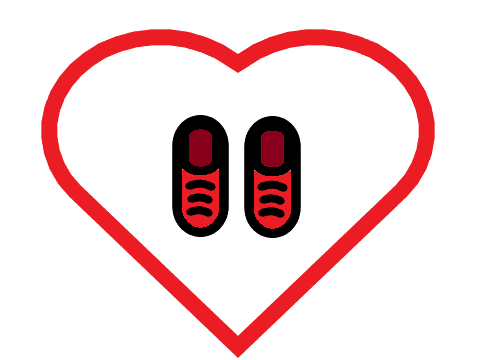
And let’s hope that this Valentine’s Day, you will get a present of just what you need:

Recently during a regular gym workout, I realized I am in a desperate need of a rest day. My body wasn’t working quite right and I kept getting winded from things that would normally not bother me at all. I decided to do a rest day and I think it was a wonderful idea. This inspired me to think and read more about importance of rest days. I will probably return to this issue in another post, talking about how to do rest days. For now, just the benefits.
There are three main aspects to benefits of rest days:
Social
So maybe this is not the top reason for taking a rest day. Some may even laugh it off as a reason, but hear me out: some days, you need to skip training, so you can attend to your social life. We need to maintain (and sometimes grow) relationships with people around us. When your kids, significant other or anybody else in your ‘village’ needs you, go for it – missing out on one run won’t hurt you, but missing out on an anniversary dinner might.
Mental
I know it’s tricky because once you give yourself a permission not to go for training, it’s easy to excuse not working out in the future. However, if you train day in, day out, your heart may stop being in it. Don’t push yourself for so long that you lose any joy in running/ cycling/ your activity of choice. I believe it’s a bit like with denying your cravings – at the end, you’re going to binge on whatever it is. Don’t let yourself get burned out! And be kind to yourself.
Physical
Bones
Overall, running is good for your bones. However, the hard pounding on a daily basis can lead to stress fractures. Rest days allow your bones time to regenerate any weak spots created during your last few workouts.
Brain
Strenuous exercise causes production of cortisol, which is the stress hormone. I know that many of us do cardio workouts to de-stress. But in some ways, this stresses our brains out. You need rest days for your brain to recover, too. And in this case, just lower intensity workout may suffice.
Muscle
Did you think that you gain muscle while you are working out? If yes, then you were misinformed. Workouts cause micro-tears to your muscle fibers. It’s that healing process that allows you to grow faster and stronger. Different sources cite different amount of time necessary for full recovery, but they oscillate between 36 and 72 hours. This is why body builders alternate what workouts they are doing each day (not that repeating the same thing every day is healthy or leads to best results… variety is the spice of life!)
Tendons
Oh, look! Here is where the ‘runner’s knees’ come into play! How many times have you been told that running will ruin your knees? Chances are: more than once. It’s probably closer to this broken cassette player stuck in your car that insists on playing whenever your car is on (for you younger people – go ask your parents about cassette players going crazy and be grateful those evil devices went by the way of the dodo 😉). The truth is, your tendons need to recover just as much as your muscles do. Unfortunately, less blood flows through them, which means they recover slower. Based on experiences of many around us: bad tendons = bad joints. And this is a lot harder to heal or repair, should a need arise. Give them a chance before you cause serious damage.
Immune system
Did you know that strenuous exercise over 120 minutes weakens your immune system? I was surprised to learn that, especially since we hear a lot that working out regularly is good for your immunity. It also got me concerned about my long workouts. First conclusion I drew from this: maybe going to the movies in the middle of the flu season after a 20 mile run isn’t the wisest choice. It takes several hours for your system to bounce back from this. At the end of the day, your immune system is like the rest of your body: it needs a chance to build back up. Give it one and take a day off from working out so hard!
Visit our shop for cool triathlete merchandise!
Subscribe to receive updates and exclusive content!

Let me start by saying this: I think there is a special place in hell for people who subject others to their music in public spaces. I mean people who ride their bikes blasting their music over speakers or skiers doing the same. I am not interested in your music and let’s face it, there is a good chance that songs will contain something inappropriate for kids around. So that’s definitely a big no from me!
Ok, that was a little rant after my weekend of being forced to listen to questionable music in lines to ski lifts (and no, the music was not coming from the PA system, it was coming out of speakers other skiers were carrying around).
Now that my rant is over: I love listening to podcasts when I run.
Race
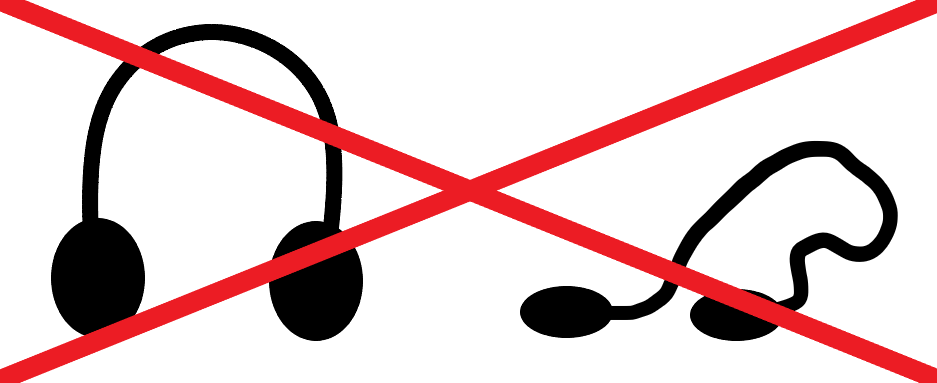
Headphones are definitely a big issue During races. Ironman has a general policy banning headphones. I think all marathons I ran said that you can have headphones, but it makes you ineligible for prizes. Personally, I am slow, so that’s not much of a disincentive for me and I do enjoy something with a strong beat once I hit the wall in a marathon. I have raced without headphones in IM70.3 Gdynia and to my surprise, I was fine. Ok, so maybe the bike ride got tough at times… But by the time I was running, it was crowded and loud and I was just fine. So check your race guidelines if you are allowed to bring them with you. Maybe you can plug into the atmosphere of the race instead?
Law

Before you get any further, check if you are legally allowed to. It’s especially relevant when you are riding a bike on regular streets. If you’re going through multiple jurisdictions, check each one of them. If at any point during your ride you are prohibited by law from using headphones – leave them at home!
Safety
One of the main concerns I have when using headphones is safety. When you are on the road or on a trail, you want to make sure you are aware of what’s going on around. You don’t want to be this guy:
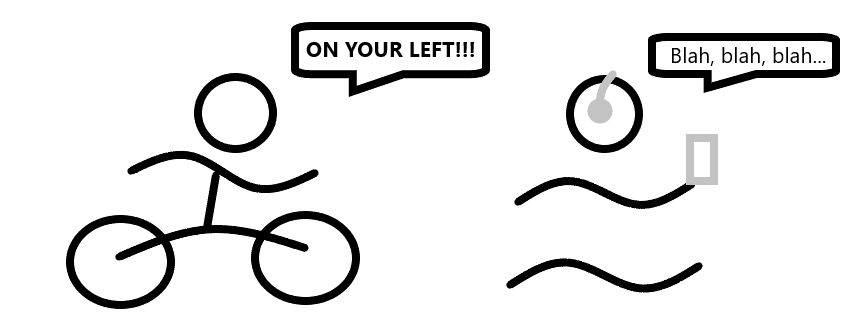
Inability to hear other people on the road is flat out dangerous! You might get hit by a cyclist. Or run into another runner. How about animals? Dogs, anybody? Or if you see this cutie:

And let’s not forget his very protective mama! Yeah, you need to know what’s going on around you. If you have to listen to something, here is a couple of suggestions:
I use a combination of all three solutions – I use non-noise cancelling headphones and keep only one in my ear, volume set in a way that doesn’t drown out everything. Some days, it’s hard to do it, especially towards the end of a particularly brutal training sessions – I like to drown out self-doubt and misery with a strong beat. But if it’s not safe, I won’t do it. Safety first!
Train how you race
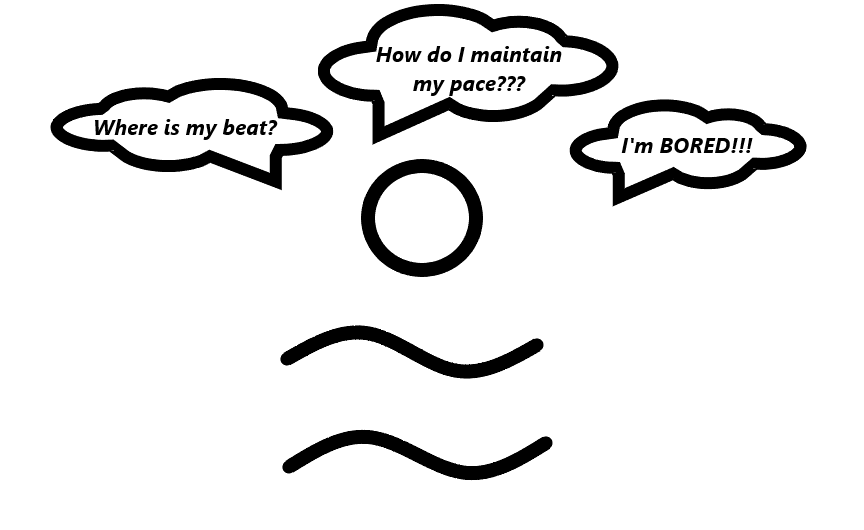
If you run/ ride just for yourself and never do any races, this is not a concern. However, it’s important to be prepared for conditions in which you will be racing. Most of us remember open water swims, hills and bad weather. But we forget to train for the right state of mind. If you will have to spend 5, 10, 14 hours alone with your own thoughts, you’d better prepare yourself for that. Race day is not a good time for experiments!
Your own state of mind
I love using my cardio sessions for my mental breaks. I do love listening to podcasts or music, but some days, it helps me clear my head if I get to experience perfect silence. I get creative ideas and solve problems when I don’t have additional stimulation and my mind wanders. Consider if that would help you. Many studies we need time to be bored. This may be a fabulous opportunity for that!
On the other hand, listening to podcasts may be stimulating to your mind. I use training time to learn new things and sometimes for pure entertainment. I don’t have much time in life for ‘doing nothing’, so I enjoy catching up on news, developments in science and subjects I ignored in school.
How about just the joy of listening to news (or your favorite comic/ gossip podcast 😉). If that’s what keeps you going, that’s great! Do it! Just make sure to consider the laws and safety first.
Side note: I have been seeing a lot of comments online about using headphones while you swim in the pool. Personally, I love training in water when I don’t have to pay attention to anything and I have zero stimulation. I come out feeling better about the world! Another thing to consider: can you safely share the lane and respond to directions from lifeguards if you can’t hear?
So should you use headphones in training?
Consider carefully all the pros and cons. Laws and safety (yours and that of others) should be your top priorities. After that, decide what you want your head to get out of the session – clearing of the mind or intellectual stimulation. Whatever you choose, make sure to enjoy 😊
Visit our shop for cool triathlete merchandise!
Subscribe to receive updates and exclusive content!
Well, then… Time to talk about getting faster at running!
Sorry for no pictures in this post – I am an accountant and beginning of the year always leaves me short on time.
I love running! It was the first sport I got into as an adult and have been doing it for ages. Unfortunately, I also happen to be relatively slow. My main advantage throughout my life came from being able to outlast people around me. But when you run with other adults who actually do their work before the race, that’s not much of an edge, is it?
Over time, I haven’t picked up too much pace, which led me to believe I am doing something wrong. Fortunately, I have my goddess of all things fitness (my coach Diana) and the internet to advise. So here are some things I have learned over time:
Lose weight
Common answer with what I saw in my cycling research. It’s simple: if you have less weight to carry with you, you get less tired and you can go faster. Now if losing weight was that easy… But it is one answer.
Eat better
I am listing it separately from losing weight on purpose. It’s all about fueling your runs better. When you are trying to lose weight, you may be focusing on cutting things out of your diet. Well, some times you may need to eat more to have something to burn during a run. In general though, to perform at top levels, you need all of your body’s needs to be met.
Sleep and recovery
Speaking of meeting your body’s needs: get some sleep. And every now and then, take a day off to allow your body to recover. There are plenty of studies out there that will tell you how much damage sleep deprivation does to your body. So stop that! Get a good night’s sleep. Recovery is another important aspect. Your body needs time to repair damage to the tissue you caused in training and to build muscle. It’s more important with running than other sports, such as biking and swimming, since it is high-impact and causes way more wear and tear.
Wear lighter gear
Ok, so this one I have mixed feelings on. Articles I have been reading keep talking about wearing lighter shoes and even leaving your phone behind when you go for a run in a safe area. I would argue that while you train, you shouldn’t skimp on weight you are carrying. I think my coach agrees – as shown by her making me wear the 20 lbs vest on my long runs. I think that the question is if you want to run faster right now or during the race. If you don’t care what your pace is on any given day, wear the heavy stuff. You will be amazed how much easier running is on the race day!
Weight lifting and core exercises
Stronger core leads to better posture. Need I say more? In general, stronger muscle leads to better performance in sports. It also reduces the risk of injuries.
Stretch
There is a dispute out there whether stretching help prevent injuries in runners or not, but one thing seems to be a recurring theme: it will make you faster. Better flexibility will help with improving your stride.
Cross training
Switching up your routine has a few benefits, not the least of which is getting to do something different. Spending a lot of time on running may get boring after a time, making it harder to work on your goals. I remember reading many years ago an interview with Shaun White where they asked him what it’s like to be a two-sport athlete. He said that it’s actually awesome because by the time snowboarding season is over, he misses skateboarding and it ready to put all his effort into it. I think it’s applicable to running as well, maybe even more relevant. Running is a lot of just looking at your own feet. Every now and again, changing the scenery may be healthy.
Good running form
How many things have I already listed before we got to actual running? But there is a deep truth to it I discovered only after working with a coach: running well is about a lot more than just hitting the pavement. So without further ado, here is what should you do when actually running to get faster.
Start by making sure your running form is right. I know what many will say: I have been running since I was a toddler! I know how to do it! Well, not so much… If you put your feet down too far in front of yourself, you are increasing a chance of injuring yourself. Maybe you slouch? That decreases the amount of air you can get into your lungs. How about swinging your arms wildly? That’s just wasted energy! So yeah, make sure your running form is as efficient as can be and doesn’t lead to injuries.
Run more
That may be easier said than done… But the fact is: if you can keep running without stopping, it will help you get across the finish line faster. And in general, just repeating the task of running will allow you to run faster. Caution: this is a living, breathing definition of law of diminishing returns. Each extra mile will give you increasingly less and less benefit with every added mile. But it’s definitely a good place to look for gains in your running.
Run on trails
I have mentioned this peace of advice before, as it was given to me by Meb himself. It’s simple and sort of revolves around the same principle as wearing lighter stuff: running on trails is harder than on a road. If you run in harder conditions while in training, you will get stronger faster and it will make the race feel easier. As a side note: same goes if you train while pushing a stroller with your kid in it. Or training in a weighted vest. Or pretty much anything else that makes the run harder (bad weather anybody?).
Hills
Ugh… How I hate those… And I don’t really have good ones around me to train on. But here is the basic idea: repeat running up a hill and then walking down it is your recovery. When you get to the bottom, turn around and run back up. Those hills will make your legs stronger, improve your efficiency and economy. Also, if you are like me and sign up for a hilly marathon (accident, I swear!), your legs will need to be able to survive it. A bit of caution though: watch our for your knees on downhills. Yes, running downhill is hard on the knees. Don’t injure yourself!
Tempo runs
My favorites! That’s when you run fast – about 25-30 seconds below your 5k pace – and work on anaerobic threshold. Your body is meant to be clearing lactate acid at the same pace as it’s creating it. The trick is to increase what speed this happens at and teach your body to maintain this level of effort for as long as possible. I enjoy them mostly because they give me a great sense of accomplishment – it feels like training well done.
Speed work – fartlek and intervals
Fartlek is when you vary your speed while running. I probably should have paid more attention to this type of training before my IM70.3, where I got stuck at a very specific pace and couldn’t speed up at the finish line… Anyway… For these training sessions, you shouldn’t be having any flat-out sprints, since you are not supposed to stop. That’s intervals – you run flat out for pre-determined amount of time/ distance and then stop and recover. After a good interval, you should be gasping for breath. It can be uncomfortable (to say the least), but if you signed up for a half-marathon or a marathon, what did you expect? To be carried by angels? Some parts of training will suck. And it will be hard. But you signed up for it, didn’t you?
So many ways to get faster! Hopefully, you can incorporate at least some of them into your training. Now is a great time to think about them, before the season starts. We want a strong start to the season, so go practice those intervals on a treadmill or get used to running dressed in a million things because it’s so cold outside! One way or another, go get it done!
Visit our shop for cool triathlete merchandise!
Subscribe to receive updates and exclusive content!